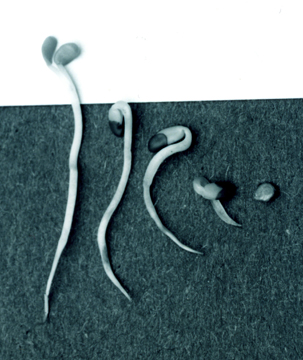
THE WATER PHASE: Tiny tomato seeds absorb water in a latent, gestational period until they finally sprout through the earth with two fat leaves of nourishment.
THE FIVE ELEMENT CYCLE
HEALING THE PAST, PRESENT
AND FUTURE continued
By Pat Gorman with Stephen Flores
Photos by Stephen Flores
The Water Element
Let us begin nature’s cycle at its most quiescent. The winter. The Chinese call this the water phase of life. Why water? Well, winter is really about the collection of water, the holding of water, filling the reservoirs for spring. In the external world, winter is a time of cold. The rain, sleet, and snow fall, but the water they bring is not used, as everything in nature is in a period of rest. So it penetrates the earth, collecting underneath in aquifers, and on the surface as ice and snow.
How does this relate to us? Well, if we lived completely in nature, we too would retreat inside to keep warm, just as the plants draw their essence below ground. There is little light—the least sunlight all year—so we’d sleep a great deal more. Any work would be mostly indoors—repairing, sewing, cooking—work that doesn’t take a lot of physical energy.
What would the result of a three-month dormancy period be for us? Think for a moment how you might feel if you were given three whole months to relax, sleep as much as you wanted, work only on small projects, and generally allowed to recoup your energy. Well, this is exactly how nature has actually designed us. By springtime you’d be rested and bursting with energy to get outside and get busy with bigger plans.
How can I possibly do anything like this, you ask. Winter for most of us is a really active time. We use electric light and controlled heat to block out the season; we get up early, stay up late. Our life demands it. And why is this departure from nature so devastating anyway?
Ongoing sleep studies at Johns Hopkins show that almost all of us are seriously sleep deprived; upon entering the study, where people are in the dark from sunset to sunrise as they would be in nature, almost everyone sleeps heavily for a period of three weeks or so (up to 12 hours a day or more) and gradually adapts to the day/night cycle of the season. In summer, that’s only six or seven hours of sleep a night, but in winter it’s over 12.
Why is sleep and rest so important? It is predominantly while resting that the parasympathetic nervous system comes on line. This permits our external self to relax, to sleep, while inside, our body can efficiently create the precious substances needed for life: neurotransmitters like serotonin, which makes us feel good; adrenaline, which keeps us up to dealing with stress; hormonal secretions needed for all bodily functions, including for sexually potency and enjoyment; and, of course repair and cleansing of the body.
After years of depriving ourselves of the daily nighttime and seasonal renewal of the water element, we feel worn-down, worn-out. Most of us start mumbling things about “old age,” when in fact, the body could be functioning at a much higher level if we gave it even a bit of what it needed. Depression often accompanies this breakdown of body and spirit, and doctors prescribe anti-depressants, which force the little serotonin we have left to be used and re-used, instead of helping us to make more, naturally, by resting.
Fortunately, nature is very forgiving, very supportive. If we cooperate just a little bit, the results will be remarkable. Add a mere half hour of sleep a night for three weeks. You will be amazed at the return. And it will be even greater if you drink the right amount of pure, clean water during that period—one ounce for every two pounds, or, for example, 80 ounces for a 160-pound person daily.
Just getting into step in this very small way will have a profound effect on your health and outlook.
